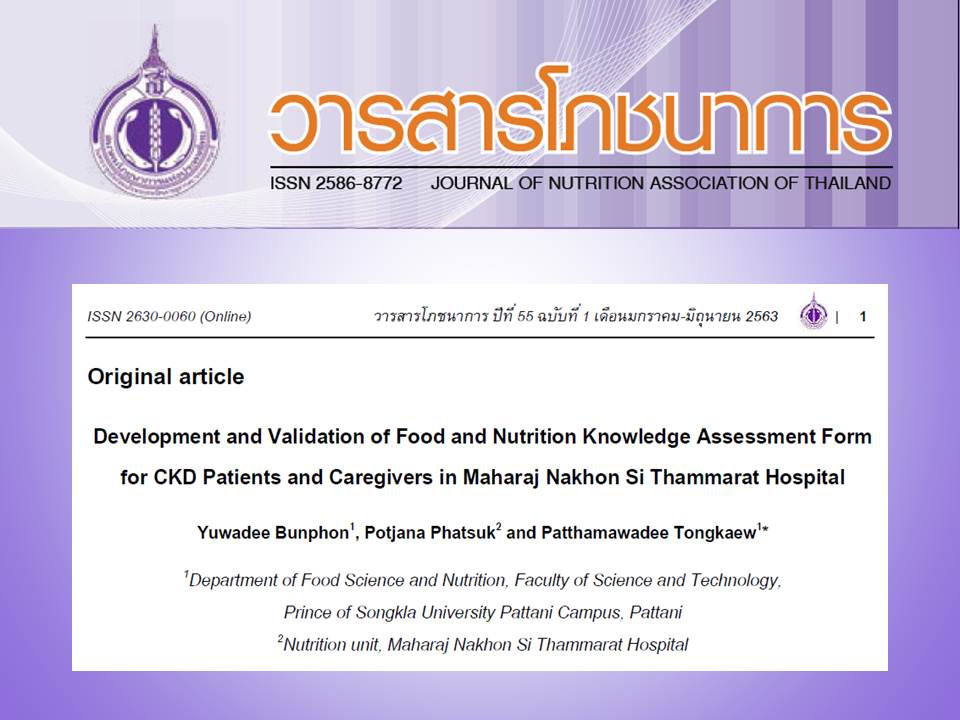Development and Validation of Food and Nutrition Knowledge Assessment Form for CKD Patients and Caregivers in Maharaj Nakhon Si Thammarat Hospital
Keywords:
Chronic kidney disease, Food knowledge assessment form, ValidationAbstract
Food and nutrition knowledge assessment is a part of the nutrition therapy program for Chronic Kidney Disease (CKD) patients of Chronic Kidney Disease Clinic, Maharaj Nakhon Si Thammarat Hospital. However, in the assessment process, there is no a valid tool used in the assessment. The purposes of this study are to develop and validate a food and nutrition knowledge assessment form and test the knowledge assessment form for CKD patients and caregivers who attend the nutrition therapy program. This study was a descriptive research. Review of literature on food and nutrition key knowledge for CKD patients was performed and used as the basis for developing a 20-item assessment form. The knowledge assessment form was verified for content validity by five experts in this area. Reliability, difficulty and discriminating power of the form were tested with 17 CKD patients and caregivers. Subsequently, the revised form was applied to 15 of CKD patients and caregivers in the nutrition therapy program. The content validity of the food and nutrition knowledge assessment form was 0.95-0.97, 0.22-0.80 for difficulty and 0.20-0.80 for discriminating power. Overall, the developed assessment form was within the acceptance criteria, but specific item content validity ranged 0.6-1.0. Four items did not meet the acceptance criteria. After revision, the form was retested, and had high reliability (0.85). When it was used to assess the knowledge gain from the nutrition therapy program, CKD patients and caregivers had significantly increased knowledge on food and nutrition, from 14.80±2.76 to 17.73±1.28 (p-value <0.05). In conclusion, the food and nutrition knowledge assessment form for CKD patients was an acceptable and applicable for assessing food and nutrition knowledge of the CKD patients in the CKD Clinic, Maharaj Nakhon Si Thammarat Hospital.
References
สมาคมโรคไตเรื้อรังแห่งประเทศไทย. คำแนะนำสำหรับการดูแลผู้ป่วยโรคไตเรื้อรังก่อนการบำบัดทดแทนไต พ.ศ.2558. 2558; 15-16.
กัลยา กาลสัมฤทธิ์. โภชนาการสำหรับผู้เป็นโรคไตเรื้อรัง. ใน: ชนิดา ปโชติการ, สุนาฎ เตชางาม. บรรณาธิการ โภชนาการสำหรับผู้เป็นโรคไตเรื้อรัง. กรุงเทพมหานคร: สาขาวิชาวักกะวิทยา ภาควิชาอายุรศาสตร์ คณะแพทยศาสตร์ศิริราชพยาบาลมหาวิทยาลัยมหิดลและโรงพยาบาลราชวิถี กรมการแพทย์ 2560; 6-9.
De Waal D, Heaslip E, Callas P. Medical nutrition therapy for chronic kidney disease improves biomarkers and slows time to dialysis. J Ren Nutr. 2016; 1(26):1-9.
Santin FG de O, Bigogno FG, Dias Rodrigues JC, Cuppari L, Avesani CM. Concurrent and predictive validity of
composite methods to assess nutritional status in older adults on hemodialysis. J Ren Nutr. 2016; 26(1):18-25.
Xia YA, Healy A, Kruger R. Developing and validating a renal nutrition screening tool to effectively identify undernutrition risk among renal inpatients. J Ren Nutr. 2016; 26(5):299–307.
ภทรพรรณ อุณาภาคและขวัญชัย รัตนมณี. ปัจจัยที่มีความสัมพันธ์กับพฤติกรรมการดูแลตนเอง เพื่อป้องกันภาวะแทรกซ้อนทางไตในผู้ป่วยโรคไตเรื้อรังของโรงพยาบาลสมเด็จ พระพุทธเลิศหล้า จังหวัดสมุทรสงคราม. วารสารสาธารณสุขมหาวิทยาลัยบูรพา 2558; 2:44-54.
รวีวรรณ รัตนเรือง, วรรณภา ประไพพานิช, พูลสุข เจนพานิชย์วิสุทธิพันธ์, สุขฤทัย เลขยานนท์. ผลของโปรแกรมส่งเสริมการบริโภคอาหารเน้นโปรตีนในผู้ป่วยไตวายเรื้อรังระยะสุดท้ายที่ได้รับการฟอกเลือดด้วยเครื่องไตเทียม. รามาธิบดีพยาบาลสาร 2557; 3(20):341-355.
วรรณคล เชื้อมงคล, สิริภา ช้างศิริกุลชัย, จิรายุทธ จันทร์มา, ชญานิศ บุญนาศักดิ์, ธนทรัพย์ ลีลาทรัพย์วงศ์. ความรู้ในการดูแลตัวเองและคุณภาพชีวิตของผู้ป่วยไตวายเรื้อรังระยะสุดท้ายที่รักษาด้วยวิธีการล้างไตทางช่องท้องอย่างต่อเนื่อง ณ โรงพยาบาลศูนย์การแพทย์สมเด็จพระเทพฯ ศรีนครินทร์เวชสาร 2559; 31(1):47-58.
สุนิสา สีผม, วรรณภา ประไพพานิช, พูนสุข เจนพานิชย์, วรางคณา พิชัยวงศ์. ผลของโปรแกรมการจัดการตนเองเพื่อชะลอความเสื่อมของไตต่อความรู้พฤติกรรมและระดับความดันโลหิต. วารสารพยาบาลโรคหัวใจทรวงอก 2556; 1(25):18-31.
Shi YX, Si W, Liu JD, Gao M, Wang SY, Cheng M, et al. Development and evaluation of the psychometric properties of the CKD-MBD knowledge and behavior (CKD-MBD-KB) questionnaire for patients with chronic kidney disease. J Pain Symptom Manage. 2016; 51(3):557–568.
ประสพชัย พสุนนท์. ความเที่ยงตรงของแบบสอบถามสำหรับงานวิจัยทางสังคมศาสตร์. วารสารสังคมศาสตร์ มหาวิทยาลัยศรีนคริทรวิโรฒ 2558; 357-397.
สุริยนต์ อินทร์อุดม. การหาคุณภาพของเครื่องมือ. 2558 [เข้าถึงเมื่อ 2563 มกราคม 20]. เข้าถึงได้จาก: https://www.mrcud2.com/news_file/p38796781434.pdf
สุจินตรา เทียนสวัสดิ์. ดัชนีความตรงเชิงเนื้อหา: ข้อวิพากษ์และข้อเสนอแนะวิธีการคำนวณ. วารสารพยาบาลสาร 2550; 4(34):1-9.
อารยา องค์เอี่ยม, พงศ์ธารา วิจิตเวชไพศาล. การตรวจสอบคุณภาพ เครื่องมือวิจัย. วิสัญญีสาร 2018; 44(1):36-42.
ปรีดาวรรณ อ่อนนางใย. การสร้างแบบทดสอบวัดความสามารถการคิดวิเคราะห์ สำหรับนักเรียนชั้นประถมศึกษาปีที่ 6 สำนักการศึกษา กรุงเทพมหานครฯ 2555; 89-95.

Downloads
Published
How to Cite
Issue
Section
License
Upon acceptance of an article, copyright is belonging to the Nutrition Association of Thailand.


